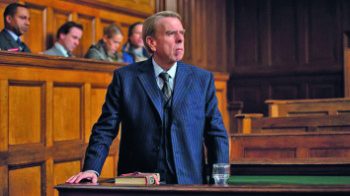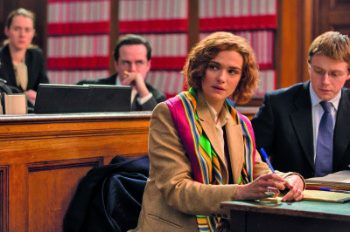Praying with Movies – Denial

Fr Brian Cummings SM
Directed by Mick Jackson
‘The difference between facts,
opinions and lies’
There are inherent challenges, and difficulties, in making a film about an overwhelmingly significant event still very much alive in the memories of people. One such challenge is that the event itself can become trivialised with depth of content sacrificed for entertainment purposes.
 Another is that key characters can become one-dimensional, with the result that it is hard to take either them, or their attitudes, seriously. Denial (directed by Mick Jackson) faces both of these challenges, and others, and overcomes them successfully. The core story is well known. In the mid-1990s English writer and self-styled historian David Irving sues American Professor Deborah Lipstadt and her publisher for referring to him as a Holocaust denier. The movie itself focuses on her years-long fight to defend the historical truth of the Holocaust and to expose Irving's views for what they are. The drama in the courtroom scenes, which occupy the majority of the film, arises partly from the nature of English libel law which requires the defendant (Lipstadt) to prove that what she said is right, rather than the plaintiff (lrving) having to show why her accusation is wrong. The huge risk in all of this, of course, is that if the defence is not successful then denial of the Holocaust becomes a plausible position for Irving, and anyone else, to continue to promote. Given the nature of the movie and its particular focus, the credibility of the characters becomes central to establishing the magnitude and significance of the case. The performances of Timothy Spall as Irving, Rachel Weiss as Lipstadt, Andrew Scott as solicitor Anthony Julius and Tom Wilkinson as barrister Richard Rampton are key to the success of Denial and ensure that the focus remains on the implications both of the claims of lrving and on the outcome of the trial. This is no small achievement given that the verdict is already known by the audience, and that David Irving is largely viewed these days in the light of the trial's outcome rather than as he was in the 1990s.
Another is that key characters can become one-dimensional, with the result that it is hard to take either them, or their attitudes, seriously. Denial (directed by Mick Jackson) faces both of these challenges, and others, and overcomes them successfully. The core story is well known. In the mid-1990s English writer and self-styled historian David Irving sues American Professor Deborah Lipstadt and her publisher for referring to him as a Holocaust denier. The movie itself focuses on her years-long fight to defend the historical truth of the Holocaust and to expose Irving's views for what they are. The drama in the courtroom scenes, which occupy the majority of the film, arises partly from the nature of English libel law which requires the defendant (Lipstadt) to prove that what she said is right, rather than the plaintiff (lrving) having to show why her accusation is wrong. The huge risk in all of this, of course, is that if the defence is not successful then denial of the Holocaust becomes a plausible position for Irving, and anyone else, to continue to promote. Given the nature of the movie and its particular focus, the credibility of the characters becomes central to establishing the magnitude and significance of the case. The performances of Timothy Spall as Irving, Rachel Weiss as Lipstadt, Andrew Scott as solicitor Anthony Julius and Tom Wilkinson as barrister Richard Rampton are key to the success of Denial and ensure that the focus remains on the implications both of the claims of lrving and on the outcome of the trial. This is no small achievement given that the verdict is already known by the audience, and that David Irving is largely viewed these days in the light of the trial's outcome rather than as he was in the 1990s.
So Denial is a very important and effective representation of a key moment in maintaining and reaffirming the truth of the Holocaust in modern history. But can we fairly ask if it does anything else?
If the movie is solely about the truth of the reality of the Holocaust, presumably it has a huge but very narrow significance.

Timothy Spall as David Irving
However, Denial is not only a film about the truth of the Holocaust. As Deborah Lipstadt said (Time, September 30, 2016), "If some people take away from this movie the notion that there's a difference between facts, opinions and lies, I will be very satisfied."
We can enter into reflection of Denial by being aware, not only of what we are thinking in response to what we are watching, but also by focussing on what we are experiencing: what moves us closer towards life and a sense of God, and what causes us to close in on ourselves. In this film there are at least three levels of denial involved.

Rachel Weisz as writer and historian Deborah E. Lipstadt
There is, obviously, the denial by David Irving of the truth of the reality of the Holocaust. But there is also Lipstadt's denial of herself, since she desperately wants to speak in her own defense at the trial, but is persuaded not to by her legal team. There is, thirdly, the denial of the various Holocaust survivors, again at the discretion of the legal team, of the chance to tell the court their story. Key to the legal strategy is keeping the focus on Irving and his claims, rather than giving him the chance to shift the focus to Lipstadt and the survivors and the truth of their stories. It is a successful strategy, but it asks so much from those who are denied the chance to speak. And that makes the point that not all denial is wrong. It is, of course, when it denies truth or reality. It isn't when it calls for denial of self in order to achieve a greater good.
‘Three No’s’ of Fr Colin
As Marists, we are familiar with the famous “Three No’s” of Fr Colin: No to Greed, No to Power and No to Prestige. For Colin, these are central elements of the Marist way. They are founded on the personal experiences he went through, but he had the insight to realise that they related not only to him but also to the attitude of Mary, as he understood her, and for that reason they came to be non-negotiable for Marists.
Colin understood how easily and subtly the desire for money, power and personal aggrandisement can enter into people’s lives and cripple them spiritually (cf. A Certain Way, Craig Larkin, page 54). For Colin, money, power and recognition were not in themselves necessarily bad or to be avoided at all costs. His question always was: “Is what we are doing in the spirit of Mary?”
Reflection on these impulses and whether we can in fact say “No” to them is central to our lives as Marists. And that is where Denial can serve as a very helpful way to contemplate key questions in our lives.
Questions such as:
- How do I cope with reality? With truth? Is it an ‘intellectual appreciation’ or a ‘commitment of the heart’?
- When faced with challenges to what I know to be true, can I maintain my integrity or do I compromise and maintain silence?
- Do I view life ‘in the spirit of Mary’? Can I resist being seduced by the desire:
- to have more than I need by convincing myself that I’m just being prudent?
- to acquire wealth because it allows me to be more in control of my own life, rather than trusting in God?
- to be the centre of attention and
- to be highly successful for my own self-satisfaction rather than for the good of others?
Denial is not only a worthwhile and successful movie, it is also an important one. Entering into contemplation through it leads us, as Marists, to ask in our turn: How do we defend truth and integrity in our world today? How do we bring the spirit of Mary into our lives and into the lives of all those with whom we come into contact?
 Entries(RSS)
Entries(RSS)